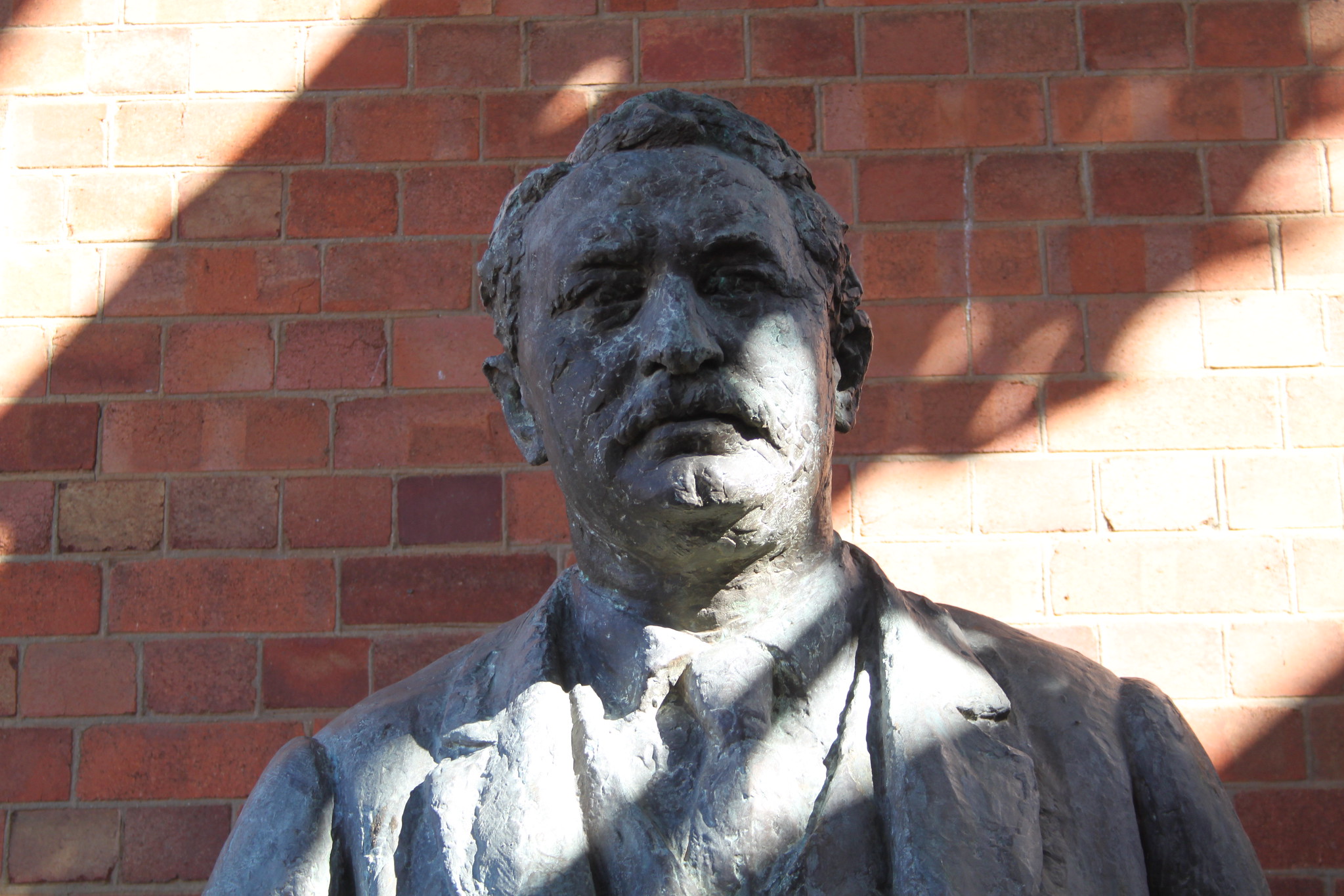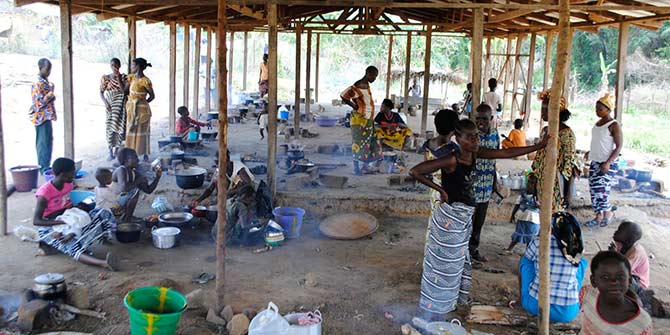Ismaila Ceesay analyses the surprise defeat of President Yahya Jammeh of Gambia by Adama Barrow in the recent elections.
This article is part of our African Elections series.
Nestled inside Senegal like a ‘hotdog in a roll’, the Gambia is surrounded on all sides by its larger neighbour, except for its short Atlantic coastline. A micro-state, the Gambia is considered to be one of mainland Africa’s smallest and ‘least important countries’ with no strategic resources. However, since gaining independence from Britain in February 1965, the country has make up for its ‘insignificant status’ by demonstrating time and again its propensity to defy existing conventional political norms in the African continent.
In the immediate aftermath of its creation as an independent sovereign state, the Gambia’s largely poor colonial legacy, combined with being poorly endowed with strategic natural and human capital resources, triggered a wave of pessimism among observers of the post-colonial African theatre. Amid the independence euphoria, some sceptics were apprehensive about the country’s survivability and long-term viability as an independent state, a sentiment aptly expressed by Berkeley Rice’s proclamation of ‘the birth of an improbable nation’, suggesting that the ex-British colony could not exist as an independent reality, and that the Gambia might sooner or later be co-opted by Senegal.

Despite all the gloomy forecasts, the Gambia survived as an independent nation. Except for a brief period in July 1981 when a group of leftist rebels made a failed attempt to overthrow the government of President Dawda Jawara and replace it with what they proclaimed to be a “dictatorship of the proletariat” under the leadership of the Libya-trained Marxist-Leninist Kukoi Samba Sanyang, the Gambia became a symbol of peace and stability in an unstable African sub-region. In addition, the country was distinguished as one of sub-Saharan Africa’s longest standing multi-party democracies. This was perceived to be an exception on a continent where military dictators held sway and one-party rule and authoritarianism the norm, making the country a deviant case.
The Gambia was once again perceived as a deviant case when a military coup in July 1994, led by a 29-year-old lieutenant Yahya Jammeh, toppled the Jawara government thereby defying the post-1989 sub-Saharan African trend away from authoritarianism towards pluralism and multi-party politics. This sweep of democratic impulses through Africa, also referred to as ‘Africa’s springtime’, the ‘second independence’ or ‘third-wave democratization’, saw mass movements against authoritarian rule by a resurgent civil society demanding the end of one-party dictatorships and the liberalisation of political spaces.
The recently-concluded elections in the Gambia and its political ramifications, to some extent, is reminiscent of political earthquakes of the same magnitude as the fall of the Berlin Wall and the subsequent disintegration of the Soviet Union in 1989-1991 and the end of Apartheid rule in South Africa in 1994. The December 1 2016 polls saw the defeat of incumbent strong man Yahya Jammeh by a united coalition in an election whose outcome defied logic that incumbents in Africa hardly lose elections and took many by surprise. What was more unfathomable was Jammeh’s decision to concede defeat to Adama Barrow, the coalition candidate, even before all the results were published. It has always been the belief that dictators of Jammeh’s ilk will never preside over elections that they know they will lose or easily concede defeat without first attempting to subvert the will of the people.
In a continent where the few standing brutal ‘dictators-cum-big men’ of the likes of Robert Mugabe, Yoweri Museveni, Paul Kagame, Omar Al Bashir, Paul Biya, Teodoro Obiang Nguema Mbasogo, José Eduardo dos Santos, Idriss Deby, Joseph Kabila and Pierre Nkurunziza are using a combination of tactics to consolidate their grip on power and extend their already lengthy rule, the Gambia, once again, became a deviant case by democratically voting out an eccentric dictator who had promised to rule for a ‘billion years’ and who has consolidated his 22-year rule through a potent mix of fear, intimidation and mysticism. In its show of deviance, what is happening in the Gambia is the first time in post-colonial Africa’s political history that a ‘military-turned-civilian’ dictator, whose rule has been so entrenched, has conceded defeat in a generally free and fair elections and is ready to peacefully hand over power.
Jammeh’s defeat in the polls is not only due to a unified and emboldened opposition, a massive social media campaign by Gambian dissidents in the Diaspora as well as a disgruntled and youthful population. It is also the result of Jammeh’s attempts, partly because of complacency, to minimally reform the electoral system by introducing ‘on the spot counting’. The transparent and efficient nature of this system inhibited any attempts of electoral malpractice that would have led to a different outcome. I could not agree more with the French political thinker, Alexis de Tocqueville’s assertion that the most dangerous moment for a bad government is when it begins to reform.
Ismaila Ceesay is a Lecturer in Political Science at the University of the Gambia. He has just finished his PhD in African studies at the University of Edinburgh’s Centre of African Studies.
The views expressed in this post are those of the author and in no way reflect those of the Africa at LSE blog or the London School of Economics and Political Science.






An intriguing piece to read. I think coupled with the massive social media campaign, the disgruntled youths and the introduction of ‘on the spot counting’; was Jammeh’s declaration of the country as an ‘Islamic State which annoyed the Christian population in the country who might have voted against him; the inflammatory statement made against the Mandinka ethnic group, making him lose in many Mandinka dominated settlements in the country; as well the killing of Solo Sandeng and the jailing of prominent lawyer and politician, Ousainou Darboe and co. These I believe have contributed immensely to his electoral failure in the Thursday polls. Equally, it was just like Gambians were ready for change as 22 years was considered too much in 21st Century democratic dispensation.
This is Kausu Drammeh USA.
Good day Mr ceesay.
Well I have read your post keenly and they were well articulated to be honest
All the same, I have few questions.
‘1. What in your opinion, the new government should do in its quest to unifying the nation? This is important for the fact that it seems the country is divided in both ethnic and political line.
3. The MOU of the coalition is three years but the president elect will be sworn on a five year term as the 1997 stipulates. What do you think could be done to avoid power vacuum?
Thank you.
Kausu Drammeh
Georgia, USA
A great stimulus!
You are right Doc, what happened in The Gambia is the first of its kind in post-colonial sub-Saharan Africa. .Someone who ruled with an iron face for 2 decades, easily accepted defeat.
In my view, based on the participatory observation I freely engaged on as an academic who suppose to draw an objective analysis,the defeat of Jammeh was obvious and the choice of the people was clearly manifested through the immeasurable crowd that follows President Barrow on Tuesday 29 Nov. Most of the youths who used to cheer him up, shifted to the Coalition camp for one reason or the other. However, the surprise for some of us is the easy acceptance of defeat which seemed to be abnormal in dictatorial regimes. As we all know that most dictators, once in power, they try by all means to consolidate their reign and will be ready to die rather than loosing their throne. Then, why did babili mansa decided to leave the highest office peacefully the way he came in. (peaceful take-over in 1994……peaceful hand-over 2016)? Well I am trying to find an answer but it seems that we need to be patient because lot of rumors and speculations are spread out daily and not many can be verified; again concerning the December 1st elections results, we are sure that a lot is to be unveiled .
However, today Gambians have spoken, they have made their choice.. Majority of Gambians are happy, the police state is over, self-censorship is over….people have once again regain their independence, voices are free, minds are free….even pens are today free, We are happy to live in a New Gambia, is like the Renaissance.
There is a rapid transformation of the New Gambia`s geopolitical environment and we sincerely wish to have you around for the interesting debates, seminars or colloquiums.
Here are two questions that I usually ask colleagues and students to provoke their thoughts on Post-Jammeh Era.
1- What`s New Gambia going to look like?
2- What will happen to Jammeh?
An interesting perspective on the Gambia’s politics, and precisely its recent electoral outcome, which couldn’t be better put. Personally, I have initially on several occasions expressed far-reaching pessimism on the chances of the opposition coalition winning the 2016 elections, holding the believe that African dictators do not lose elections. However, just few days before the voting, upon a lazy stroll in town, I came to sense the dawn of change in The Gambia. Never before have I seen such passion among youths, students, hawkers, bureaucrats, taxi drivers and even children; notwithstanding the security officers outrightly clamoring for change and support for the opposition. This sudden change in The Gambia political atmosphere shows that even of the mightiest dictators who are hell-bent on oppressing their people, can be revolted against in a blink of time.
As Dr Ceesay noted, The Gambia has shown otherwise in what is known to be African elections: violence and elections rigging. Still it gives me great joy and satisfaction to know that the fundamental pillars that The Gambian society is built on -which cherishes solidarity, tranquility, sharing and understanding – has not in anyway crumbled even in the worst of the trying times. These values have been manifested throughout the elections period.
Now it’s due for institutional cleansing and development!